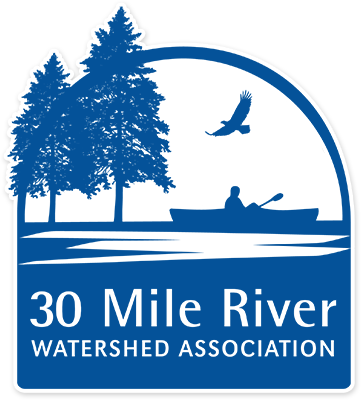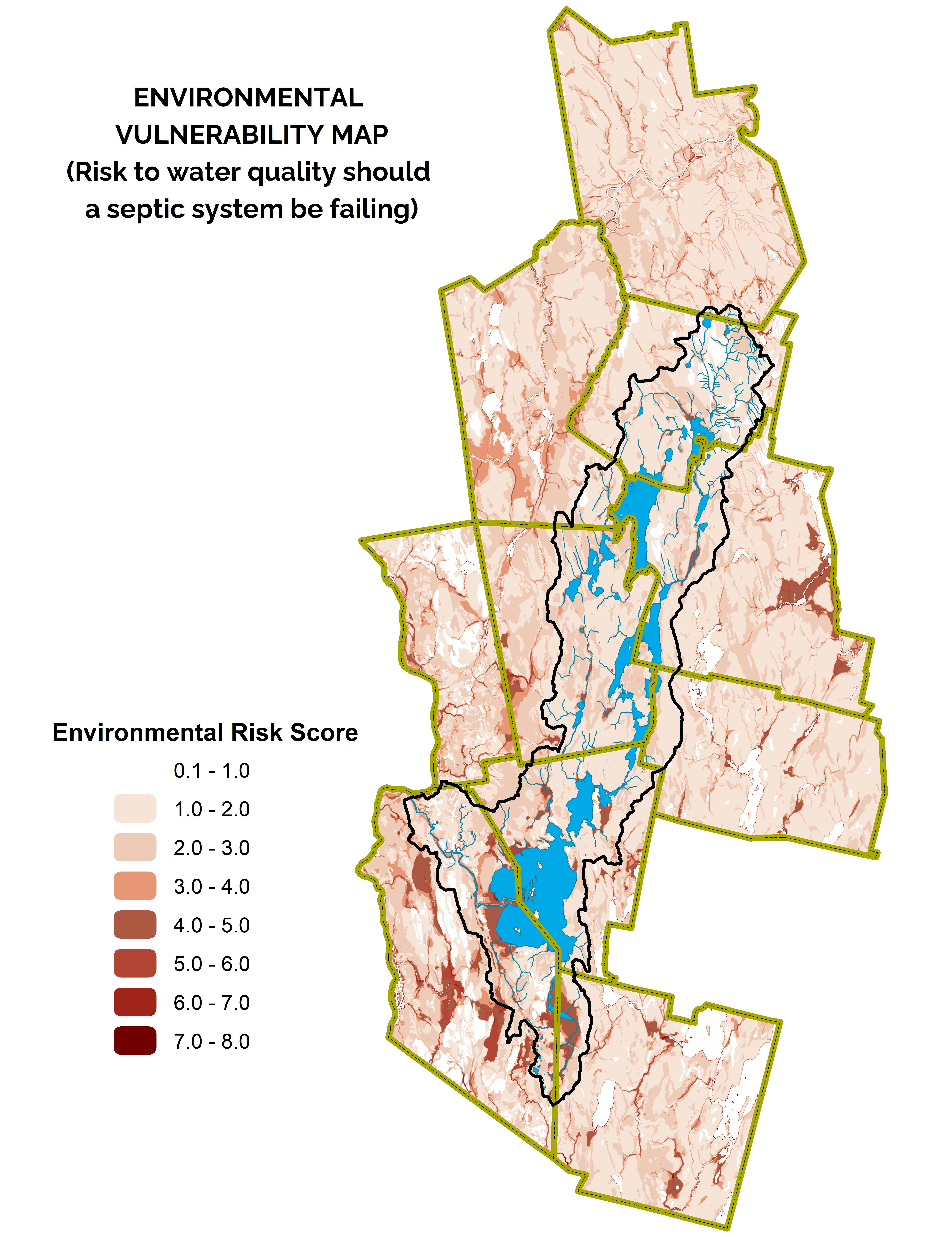Septic System Vulnerability Study
Background
Properly functioning septic systems treat wastewater from our camps and homes – protecting both human and environmental health by capturing chemicals, harmful bacteria, and other pathogens that can make us sick. Septic systems also capture nutrients like phosphorus, which is found in high concentrations in human waste. When too much phosphorus enters a river or lake, the algal population can explode. The result is an “algal bloom” that not only hinders lake health by decreasing oxygen levels that can lead to fish kills, but also has negative economic impacts.
All residents benefit from clean and healthy lakes. These waters are public resources, available for all to enjoy. Your towns’ tax base depends heavily upon taxes from waterfront properties (over 50%) and our shorefront property values are directly tied to water quality. Furthermore, local economies depend upon visitors to these waters.
A Watershed Septic Environmental Risk Assessment Mapper
In 2023, 30 Mile was awarded a generous grant from the Maine Outdoor Heritage Fund (MOHF) to complete a regional septic system vulnerability study and database for the entire 30 Mile River watershed. This funding, along with matching contributions from 30 Mile and the towns of Fayette, Leeds, Mount Vernon, and Wayne, the vulnerability study was completed in early 2024 and now provides a comprehensive, data-based view of the risk of pollution from septic systems in our watershed. The results of this study will focus our efforts on areas which are most likely to provide a gain in water quality protection, help watershed towns make well-informed policy decisions, and will help us educate homeowners and spread awareness about this issue.
30 Mile is now working with participating towns to populate the resulting database with publicly-available septic system data.
IS YOUR SEPTIC SYSTEM SAFE FOR THE LAKE?
As a homeowner, you are responsible for locating and maintaining your septic system. Regular maintenance will not only protect your lake and other nearby surface and groundwater from being contaminated, but also will protect your health and your investment in your home.
There are many things you can do to ensure your septic system is functioning properly and not contributing pollution to your lake or drinking water. Answer the questions below to learn what you can do now:
Do you know where you septic system is located?
Yes!
That’s great! As surprising as it may seem, many homeowners often don’t know where their septic system is located. Knowing the location of your septic tank and leach field is critical for monitoring and maintenance of your system.
I have no idea....
Knowing the location of your septic system is a must. In order to know how your system works, and to maintain it properly, you need to know where it is.
For systems installed after July 1st, 1974, the location of your system components is included in your septic permit that should be on file at your town office. Contact your local Code Enforcement Officer to learn more.
You may also locate your septic permit using the State Septic Permit Search. This service is provided by a third party working in partnership with the State of Maine. Click HERE to begin.
Do you know how old your septic system is?
My system was installed pre-1974
Maine’s subsurface wastewater disposal system rules were enacted on July 1st, 1974, requiring a permit and a design by a licensed site evaluator.
Septic systems installed prior to the enactment the state’s subsurface wastewater rules were based on a “perc test” that prized coarse, well-draining soils. We now know that septic systems installed in coarse soils on the lake front, can pose a risk to water quality and human health because wastewater can drain too quickly through the soils – entering groundwater and adjacent surface waters untreated.
The state’s present system of “site evaluation” is a much more accurate way to design your system, and there are now many more options for the type of system that will best fit the conditions on your property. Grandfathered systems still in use today, are likely only functioning because they are located in well-drained soils (and are not properly treating wastewater). For this reason, any system installed prior to 1974 should be replaced.
My system was installed between 1974 and 1995 OR is 30-40 years old
On July 1st 1995, Maine’s subsurface wastewater disposal system rules were amended, to address the problem of rapid permeability in coarse soils and increased the minimum depth required between the leach field and underlying bedrock. Even permitted systems installed between 1974 and 1995, could pose a risk if located in coarse or shallow bedrock soils. View the septic risk mapper to see if your property could be at risk.
Depending on use and maintenance, the average life expectancy of a septic system is between 30-40 years, as the surrounding soil can become ineffective at treating wastewater after this time. If your system is approaching this age, consider contacting a septic inspector and/or a licensed site evaluator to assess your system.
My system is less than 30 years old
Great! Depending on use and maintenance, the average life expectancy of a septic system is between 30-40 years, as the surrounding soil can become ineffective at treating wastewater after this time.
Learn more about how to best maintain your septic system HERE.
When was the last time your septic system was pumped?
Less than 3-5 years ago
That’s great! Pumping your septic system every 3-5 years puts you on a great track for having a healthy and lasting system.
More than 3-5 years
It’s time to get your septic system pumped! Making sure your septic system is pumped every 3-5 years is critical for proper function. A full or clogged system results in untreated wastewater reaching your lake.
Check out our list of local septic companies below to get yours pumped.
Do you experience slow draining sinks/toilets, greener grass, odors, or water at the surface of your leach field?
Yes, I'm experiencing one or all of the above issues
Common signs of a malfunctioning septic system include a strong odor near the septic tank or leach field, Exceptionally lush grass or other vegetation near the leach field, Pooling water around the
system or in the basement of a home, or household drains backing up or slowly draining.
Some types of malfunctions may be entirely underground with no visible sign of a problem, for example, if the leach field drains too quickly or is in contact with groundwater.
Any type of malfunction has the potential to deliver untreated
wastewater, containing bacteria, viruses, and high levels of nutrients into adjacent water resources.
Consider contacting a septic inspector and/or a licensed site evaluator to assess your system if you suspect your system may be malfunctioning.
No
Great!
However, regular system inspection and maintenance of your system (i.e. tank pumping) will ensure proper functioning into the future.
Has your system been inspected in the last 3-5 years?
Yes, we just recently had a certified septic system inspector come to our property
Good! Keep up the good work!
No, we haven't had any issue in years, so we think we're good
While Maine requires that a failing system be fixed, there is no inspection requirement after a system is permitted and installed. Because of this, it is generally unknown whether a failing system will even be discovered or repaired promptly.
Any part of a septic system may be a source of malfunction: pipes, tanks, and distribution boxes can be damaged or broken. Some malfunctions are visible to the homeowner or an inspector above ground (lush vegetation, pooling water, slow draining pipes, etc.), but other malfunctions may require a more thorough inspection to identify. One of the most challenging malfunction conditions to discover is a lack of separation distance between
the disposal field and the water table.
US EPA recommends that the average septic system be inspected by a certified septic inspector once every 3-5 years.
How has the use of your property changed over time?
Yes, we added an addition to accommodate more rooms for our growing family and/or guests, but have upgraded our septic system accordingly.
That’s great! Continue to pump-out and inspect your system once every 3-5 years, and learn more about proper care.
Yes, we’re now using it year round, rather than seasonal.
Be sure your pump-out schedule reflects the change from seasonal to year-round use – you will need to pump your tank more frequently.
Yes, we are now using our camp as a rental property.
While seasonal properties that do not get heavy use may require less pump-outs, rental properties that get heavy seasonal use will need more frequent pump-outs to keep up with the increased use. Consult a septic pumping professional to determine a recommended pumping schedule for your rental.
Your septic system could be too small for the average number of people using the rental. Additionally. Consult your local CEO and a licensed septic inspector/site evaluator to determine if you system is adequately sized.
More Septic Resources for Homeowners:
30 Mile River Watershed Septic Risk Mapper: https://experience.arcgis.com/experience/6ec5c97dde4d4b3b9c07c2899495c96c/page/Page/
State Septic Permit Search: https://www.maine.gov/dhhs/mecdc/environmental-health/plumb/SystemSearch.htm
Maintaining your Septic System: https://cdn.branchcms.com/DrynVOJolO-1457/docs/Lake%20Library/Septic-two-pager-11×17-FINAL-5.14.21.pdf
List of licensed site evaluators, certified septic installers, and certified septic inspectors:
https://www.maine.gov/dhhs/mecdc/environmental-health/plumb/lists.htm
Local Septic Tank Pumpers:
Harris Septic Services – Chesterville
Brackett’s Pumping – Franklin County
Pat Jackson Septic – Belgrade & Augusta
W.E. Fenderson Sanitary Service – Androscoggin County
Maine Septic & Pumping – Androscoggin County
Dan Stanley’s Septic Service – Litchfield
Stanley’s Septic & Construction – Fairfield
Learn more about the Environmental Protection Agency (EPA) SepticSmart program, including advice and guidance on maintenance at www.epa.gov/septic.
Do you rent a camp or own a business? EPA has created a number of helpful handouts and posters for businesses and homeowners about septic health to post for their renters and employees. For more information and to download printable versions visit their website: www.epa.gov/septic/septic-systems-outreach-toolkit.
Photo Credit: Josh Robbins (Banner)


